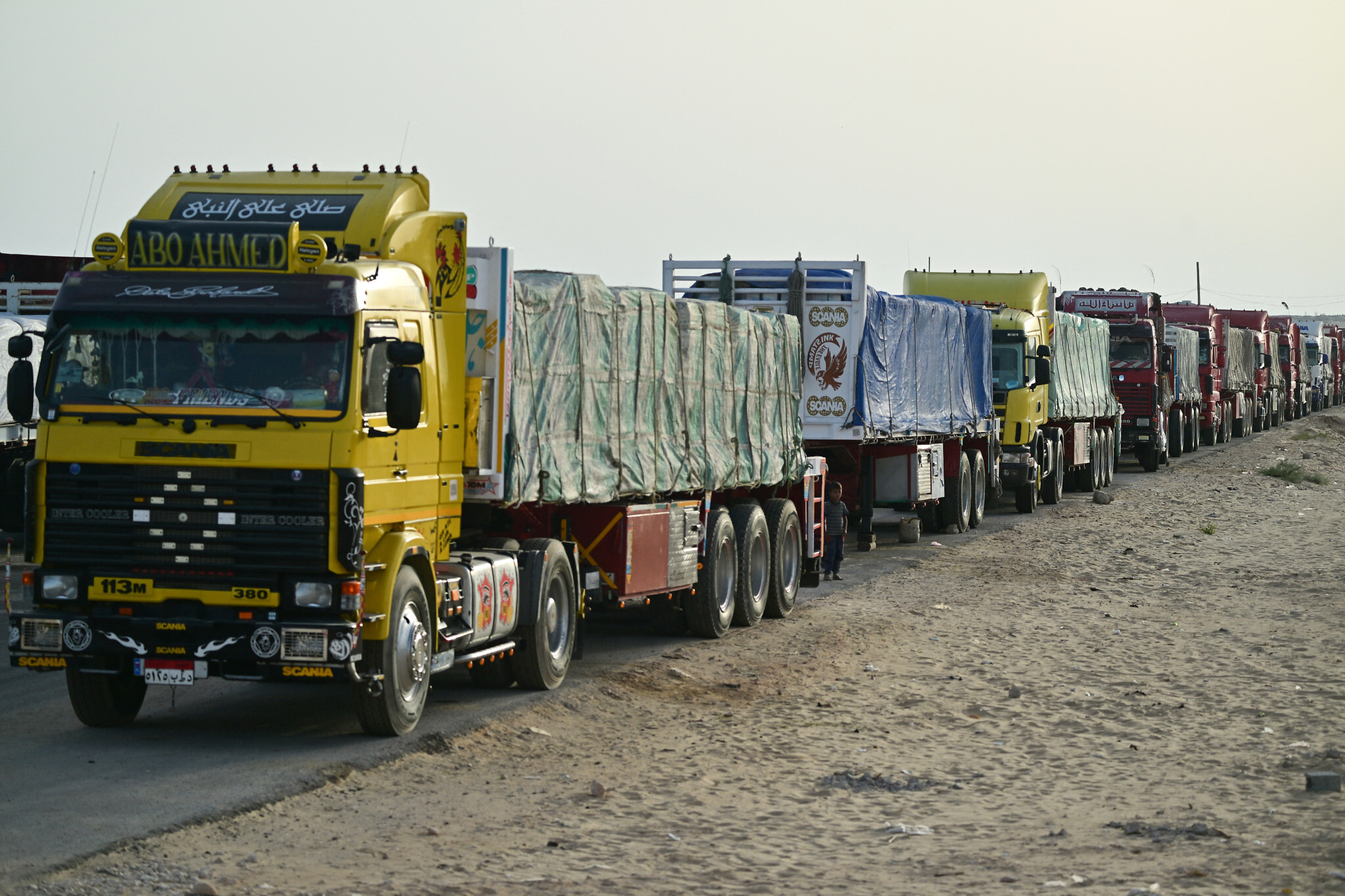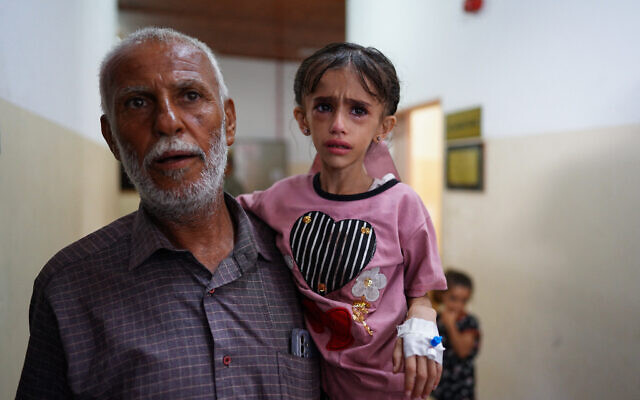



The Israeli civilian coordination agency for the Palestinians, known as COGAT, stated at the High Court of Justice on Sunday that UN and humanitarian organizations were failing to take advantage of the efforts it and the military have made to facilitate the provision of assistance, asserting they had failed to collect and distribute some 35 percent of the aid brought into Gaza by Israel last month.
The head of COGAT, Maj. Gen. Ghassan Alian, rejected claims by the UN and other aid groups that the humanitarian aid delivery corridor the military opened from the Kerem Shalom crossing in southeast Gaza to central Gaza was in any way dangerous for the staff of those organizations, stating that some 150 trucks from the private sector use it every day.
The COGAT representative also told the court that there is no humanitarian crisis in the northern Gaza Strip due to the practically unfettered access of humanitarian aid to the area in recent months.
Northern Gaza was designated by humanitarian groups as the region most at risk of famine in early 2024, with the World Food Program even stating that a “full blown famine” had broken out there, but COGAT said there was no limit on the amount of aid going into the region and that assistance coming via Jordan and the Port of Ashdod was flowing freely.
The head of COGAT insisted during the court hearing that Gaza’s water and fuel requirements were being met, and that all requests for the entry of medicine and medical equipment by humanitarian organizations working in the war-torn territory were approved by the Israeli authorities.
Alian made his comments in what was the fourth hearing held by the High Court over a petition filed by the Gisha human rights organization and other groups in March requesting the court order the government to allow unhindered access of humanitarian aid at scale to Gaza amid the ongoing war started by Hamas’s October 7 terror onslaught.
The attorney for Gisha insisted however that the aid organizations operating in Gaza say the humanitarian situation was still “catastrophic” and that COGAT and the Israel Defense Forces were still not providing an adequate response to the problems in the territory.
Pointedly however, Justice Noam Sohlberg expressed considerable impatience with the petitioners, stating that asides from general claims by aid organizations, there was a notable lack of concrete data from Gisha regarding any dearth in supplies and humanitarian necessities.
Sohlberg also intimated during the hearing that information and statements made to the court behind closed doors indicated the aid organizations were more satisfied with the humanitarian situation than they have stated in public.
Following the end of the hearing, the court gave the state until July 31 to file a supplementary submission with additional information requested by the court.
Addressing the situation in northern Gaza, Alian told the High Court that on average 30 trucks of aid per day enter through two of the three crossings between Israel and northern Gaza, and that as a result the area “is no longer part of the discussion” regarding humanitarian concerns in the Strip.
He said that the humanitarian situation in the rest of Gaza was “reasonable,” and that the IDF operation in the Strip’s southernmost city of Rafah had created a lot of difficulties.
“We’re not saying situation in Gaza is good, the situation is complex like any other war zone,” said Alian, while insisting several times the IDF and COGAT had put in place numerous measures to alleviate the problems, and asserted UN and humanitarian aid organizations were not fully utilizing the crossings and efforts made by the Israeli authorities to distribute the aid.
He noted that 5,283 trucks entered Gaza during June but that only 3,414 were collected from the Gazan side of the crossings by the aid organizations and distributed.
Alian also pointed to a backlog of 1,200 trucks which had been stuck at the crucial Kerem Shalom crossing and whose contents had not been collected by aid organizations, which he said had caused further delays in distributing aid, but that this figure has now been reduced to 500 trucks over the past few weeks.
An issue that has continued to hamper the provision of humanitarian aid to the local population is the continued efforts by Hamas to seize humanitarian aid and distribute it itself, both in order to make money and to preserve the terror group’s role as ruler of Gaza, Alian said.
In terms of improving access to medical care, Alian said that there were currently 11 field hospitals operating in the IDF-designated humanitarian zone in southwest Gaza, alongside ten regular hospitals still operating in the rest of the enclave.
He said that 30,000 vaccines had been delivered into Gaza in the last week and two million vaccines had been transferred in recent months, along with 1,000 units of blood, as well as supplies of painkillers and anesthetics.
And he insisted that all requests for medicine and medical equipment are approved and that their delivery is prioritized.
Other developments included COGAT’s enabling of work by the Palestinian water authority and aid organizations to fix and operate sewage facilities, water wells and pumping stations, as well as the entry to Gaza of equipment to maintain sanitation systems.
He said work was being done to connect an electricity line from Israel to a desalination plant in Khan Younis, which will provide 20,000 cubic meters of water a day to the humanitarian zone.
Efforts are also being made to remove rubbish which has accumulated in numerous areas of Gaza and poses health risks to the local population, Alian said.
Representing Gisha, attorney Osnat Cohen-Lifshitz cast doubts on COGAT’s statements to the court, saying the UN and humanitarian aid organizations continue to define the situation in Gaza as “catastrophic.”
Sohlberg asked testily what Gisha was actually seeking through its petition, given the detailed information COGAT provided about its efforts to increase the supply of aid and improve the situation on the ground. He also questioned the veracity of what the aid organizations say publicly.
“We see and hear things [in court proceedings] behind closed doors regarding a daily, ongoing connection with the humanitarian aid agencies, specific things, we go into the finest details,” he said.
“The humanitarian aid organizations know to give appreciation for this. What happens in public is not necessarily what they say to the IDF in secret.”
Sohlberg challenged Gisha to provide the court with specific problems backed up by data so it could understand what the exact concerns are.
“There is a declaration here twithout any basis of facts which can be verified,” Sohlberg said,
Cohen-Lifshitz pointed to reports of children lining up for hours to receive water, but did not provide further details, and also told Sohlberg that the court was at liberty to reject the petition if it felt the humanitarian situation was adequate.
“The respondents are doing not a little,” conceded Cohen-Lifshitz.
“But they are not doing enough and they are not telling the court the massive damage they are doing and the manner in which they are inhibiting the humanitarian project,” she insisted.
One key issue regarding the provision of humanitarian aid to Gaza has been problems with delivering the aid inside the Strip, due to intense fighting, damage to roads, Hamas’s efforts to seize the aid and other concerns.
In the middle of June, the IDF declared that a “humanitarian corridor” along a route from the Kerem Shalom goods crossing to the humanitarian zone in southwest Gaza which would be open between 8:00 a.m. and 7:00 p.m. for the collection, transportation and distribution of aid.
Gisha stated that humanitarian organizations have said the corridor passes through combat zones and was therefore not safe, but Alian firmly rejected this claim.
He stated that some 150 trucks operated by the private sector travel along the route every day, and that over the last weekend 50 trucks operated by humanitarian aid organizations had delivered aid via the route as well.
“Not one person has been killed,” along the route Alian insisted.
In a rare and unusual step, the court allowed a resident of Kfar Maimon and a bereaved mother named Iris Berenstein whose son was killed during the current war to speak in protest against the provision of humanitarian aid to Gaza, and the hearing in the court itself.
“The people are embarrassed, the people are not with you in this struggle,” she told the petitioners, accused them of endangering IDF soldiers and the hostages, and labelled them “traitors.”
Supreme Court Acting President Uzi Vogelman offered Berenstein his condolences but insisted that “The State of Israel is not the same as its enemies, it is a state of the rule of law which observes its international obligations,” adding that the High Court examines concerns about such issues “even during a time of war.”
Gisha strongly criticized the court for allowing Berenstein to speak and “incite” against the organization’s attorneys, saying that the court “has a duty to protect the attorneys who appear before it and ensure that they can do their job without fear.”




